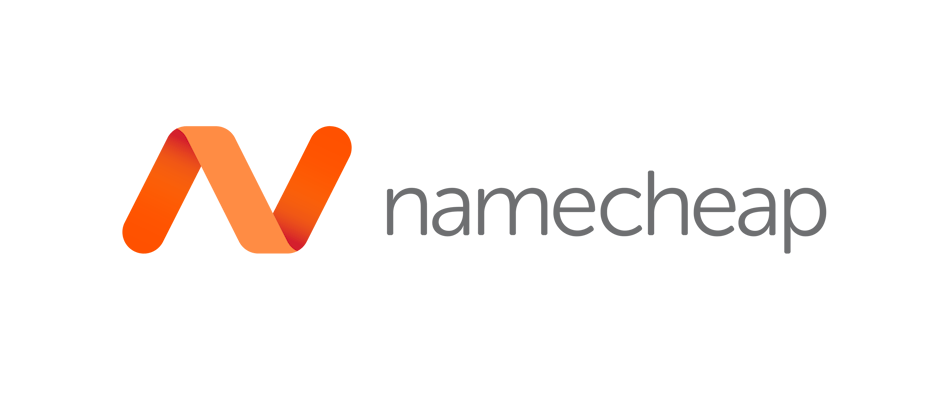
If you're thinking about trying Namecheap web hosting, you’re in the right spot. In our review, we’ll explore everything you need to know — features, pricing, performance, and support — to help you decide if Namecheap is the perfect fit for your website.
Web hosting is like the foundation of your online home — it keeps everything running smoothly, ensuring your site is fast, secure, and always accessible. Whether you’re a budding blogger or managing a growing business, finding a host that’s affordable, reliable, and packed with great features is a big deal.
Today, we’re putting Namecheap under the microscope. Known for its budget-friendly services and easy-to-use tools, Namecheap has been a go-to for web hosting and domain registration since 2000. With over 17 million domains managed, it’s made a name for itself as a trusted industry player.
Why listen to us? We’ve been through the ups and downs of web hosting and are here to share honest, straightforward insights. Our mission is to arm you with the details you need to make the best choice for your website. So, grab a coffee, settle in, and let’s see if Namecheap delivers what you’re looking for.
| Website | Namecheap.com |
| Hosting types | Shared, managed WordPress, VPS, reseller, and dedicated server hosting |
| Pricing | $1.98 – $264.88/month |
| Money-back guarantee | 30 days |
| Uptime guarantee | 100% |
| Server locations | The USA, the Netherlands (shared hosting only), the UK (shared and reseller hosting), and Singapore (shared hosting only) |
| 24/7 customer support | Yes |
| Best deal | 47% – 100% off coupon > |
Highlights from testing Namecheap
Namecheap has hosting plans for everyone, whether you're just starting your first website or managing a high-traffic powerhouse. From shared hosting to VPS and dedicated servers, they’ve got you covered without breaking the bank.
Their security features are solid, and the management tools are a breeze. But, let’s be real — not everything’s perfect.
When it comes to customer support, it’s a mixed bag. They’re there for you 24/7, but response times can sometimes feel a little slower than you’d hoped.
Want to snag a deal? Check out the latest Namecheap discounts and save on your hosting plan today.
Overview of Namecheap's web hosting services: What do you get?
With a presence in over 18 countries and more than 17 million domains under their management, Namecheap stands out for its unbeatable combination of affordability and reliability. So, what exactly can you expect when choosing Namecheap as your web host? Let’s take a closer look:
A whole variety of hosting types – With options like shared hosting, managed WordPress, VPS, dedicated server hosting, and reseller hosting, Namecheap is equipped to meet the needs of everything from personal blogs to large-scale business sites.
Affordable pricing – Competitive rates across hosting plans, with frequent discounts and promotions.
Industry-standard cPanel – A user-friendly control panel that simplifies website management, perfect for all experience levels.
Softaculous app installer – Allows easy installation of over 100 applications, including WordPress, with just a few clicks.
100% uptime guarantee – Both shared and dedicated hosting plans come with a monthly uptime guarantee, with service extensions for any downtime.
Free domain for a year – Included in many plans, helping you save on initial setup costs.
Free email accounts – Adds professionalism to your website without extra charges.
Website migration – Complimentary migration services for those switching to Namecheap from another provider.
SSL certificates and DDoS protection – Enhanced security features to protect your website and user data.
Automatic backups – Available on some plans to safeguard your data, though not guaranteed for every plan.
Domain privacy – Keeps your personal information safe when registering domains.
Bitcoin payments – Offers flexibility in payment options for tech-savvy users.
While Namecheap offers superb value, watch out for inconsistent speeds and unguaranteed backups. For affordable, beginner-friendly hosting, it’s a good choice, but consider its limitations for larger sites.
Pros and cons of using Namecheap
Namecheap offers a cost-effective web hosting option with some great features, but it’s important to consider both the pros and cons. Let’s take a look to help you decide if it’s the right fit for you:
+ Pros
Super affordable prices starting at $1.58
User-friendly cPanel interface
Free domain for a year
- Data centers in the USA, the UK, the Netherlands, and Singapore
Bitcoin accepted
- 100% uptime guarantee for shared and dedicated plans
Free domain and migration
Free features (SSL installation, Supersonic CDN)
Comprehensive knowledge base
Solid security features
– Cons
Free SSL only for the first year with shared plans
Extra cost ($1/month) for using UK data centers
Some hidden fees and higher renewal prices
No phone support
Now, let’s take a deeper look at Namecheap’s plans and see what they bring to the table.
Pricing and plans: How much does Namecheap cost?
Namecheap offers hosting plans to suit pretty much everyone — whether you’re a newbie starting your first blog or a pro managing high-traffic sites. Budget-friendly solutions for beginners? Check. Powerful servers for demanding sites? They’ve got you covered.
Let’s start by exploring their shared hosting packages.
Shared hosting plans: What do you get with Namecheap?
| Shared hosting plan | Price per month (paid monthly) | Price per month (paid yearly) | Price per month (for two years) |
| Stellar | $4.48 | $1.98/month for the first term, then $48.88/year | $1.58/month for the first term, then $91.88/two years |
| Stellar Plus | $6.48 | $2.98/month for the first term, then $74.88/year | $2.28/month for the first term, then $130.88/two years |
| Stellar Business | $9.48 | $4.98/month for the first term, then $112.88/year | $4.48/month for the first term, then $224.88/two years |
Namecheap’s shared hosting plans are an affordable and feature-packed choice for personal sites and small businesses. Starting at just $1.98 per month for the first year, these plans offer fantastic value, with perks like unmetered bandwidth, a free domain for the first year, SSL certificates, a site builder, AI tools, and even free site migration within 24 hours.
The “Stellar” plan is great for beginners, supporting up to three websites with 20GB of SSD storage. Stellar Plus ups the game with unlimited websites, unmetered storage, and automated backups. For those who need a bit more, “Stellar Business” offers 50GB of SSD storage, cloud storage, and extra reliability for growing websites.
While these plans are super affordable, remember that shared hosting means sharing resources with other websites, which can sometimes affect speed during traffic spikes. Even so, Namecheap’s shared hosting is a solid pick for anyone looking for budget-friendly and beginner-friendly hosting.
Managed WordPress hosting: Which plan fits your needs?
| Managed WordPress hosting plan | Price per month (paid monthly) | Price per month (paid yearly) |
| EasyWP Turbo | $12.88 | $4.91/month for the first year, then $94.88/year |
| EasyWP Starter | 6.88 (first month is free) | $2.91/month for the first year, then $48.88/year |
| EasyWP Supersonic | 19.88 | $5.74/month for the first year, then $114.88/year |
Namecheap’s “EasyWP” hosting takes the stress out of managing WordPress sites. It’s fast, simple, and beginner-friendly — perfect for a smooth experience without diving into highly technical know-how.
The “EasyWP” Starter plan gets you going with 10GB of storage, support for 50,000 monthly visitors, and a free CDN for better speed. Need more power? The “Turbo” plan ups the ante with 50GB of storage, room for 200,000 visitors, and a boost in performance with 1.5x more CPU and RAM. For high-traffic sites, the “Supersonic” plan delivers 100GB of storage, 500,000 visitors, and a 99.99% uptime guarantee — all at a price that’s hard to beat.
Each plan also includes handy extras like a free SSL, Brizy site builder, and advanced security tools like HackGuardian. While EasyWP costs more than Namecheap’s shared hosting, it’s optimized for WordPress and claims to be up to three times faster.
Of course, there are trade-offs. EasyWP is limited to one site per plan, and SSL is only free for Namecheap domains — something to keep in mind if you’re hosting elsewhere. For users needing more features or support for multiple sites, alternatives like Hostinger might be worth a look, though they come with a higher price tag.
VPS hosting plans: Are they any good?
| VPS hosting plan | Price per month (paid monthly) | Price per month (paid quarterly) | Price per month (paid yearly) |
| Pulsar | $9.88 | $8.88/month for the first term, then $26.64/quarter | $6.88/month for the first term, then $82.56/year |
| Quasar | $15.88 | $14.88/month for the first term, then $44.64/quarter | $12.88/month for the first term, then $154.56/year |
| Magnetar | $28.88 | $26.88/month for the first term, then $80.64/quarter | $24.88/month for the first term, then $298.56/year |
Namecheap’s VPS hosting is a great choice for those ready to move beyond shared hosting. With options ranging from 2 to 8 CPU cores, up to 12GB of RAM, and 240GB of SSD RAID 10 storage, these plans offer plenty of power and flexibility.
The “Pulsar” plan is an affordable entry point with 2 CPU cores, 2GB of RAM, 40GB of storage, and 1TB of bandwidth for $6.88 per month. For bigger needs, the Quasar plan offers 4 CPU cores, 6GB of RAM, and 3TB of bandwidth at $12.88 per month. The Magnetar plan tops the range with 8 CPU cores, 12GB of RAM, and 6TB of bandwidth for $24.88 monthly.
These plans are budget-friendly for unmanaged VPS hosting, giving you full root access and total control.
If you want managed support and a control panel like cPanel, you can add them, but the cost jumps significantly.
While Namecheap’s VPS plans are a steal for the price, the limited selection might not suit everyone. For tech-savvy users or growing businesses, Bluehosts’s VPS hosting offers solid performance and control without breaking the bank.
Dedicated hosting plans: Powerful performance for high-traffic sites?
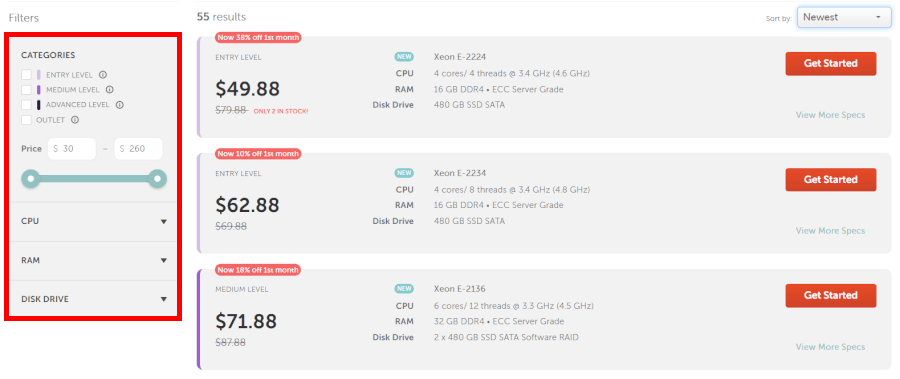
Looking for serious performance for your high-traffic website? Namecheap’s dedicated hosting plans might just be what you need. With 55 configurations on the menu, there’s something for everyone — from smaller businesses to massive enterprise projects. Prices start at $49.88 per month for an unmanaged 4-core server with 8GB of RAM and go up to $212.88 for a beastly 16-core CPU with 128GB of RAM and lightning-fast NVMe storage.
Namecheap sweetens the deal with free site migration and a 99.99% uptime guarantee. Just remember, at the entry-level price, these are unmanaged servers, so you’ll be in charge of maintenance. Need a helping hand? You can upgrade to a managed plan with cPanel for an extra $65 per month — still a solid deal compared to similar providers.
The catch? Namecheap’s servers aren’t very customizable. What you see is pretty much what you get — no extra RAM or backup drives to tack on. Plus, servers are only located in Arizona, which might not work for international businesses looking for data centers in Europe or Asia.
Reseller hosting: Does it deliver on flexibility and profit?
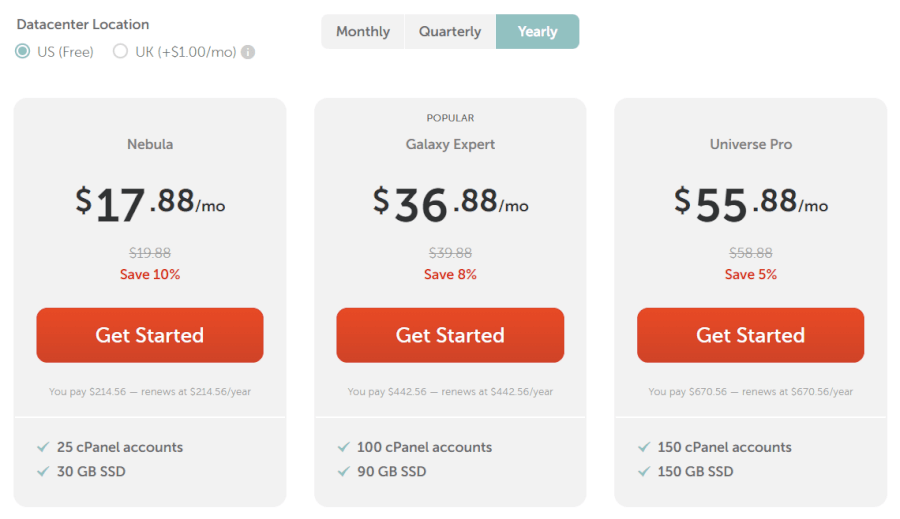
Namecheap’s reseller hosting plans — “Nebula”, “Galaxy Expert”, and “Universe Pro” — are a solid option for web developers and small businesses looking to offer hosting services without the hassle of managing expensive infrastructure. With unmetered bandwidth, free cPanel/WHM, and support for unlimited domains, these plans make juggling multiple client websites feel less like work and more like an opportunity.
Starting at just $17.88 per month, you can choose between plans offering from 30GB up to 150GB SSD, complete with up to 150 cPanel accounts. The ability to pick server locations (US or UK) adds a layer of flexibility, while essential management tools make scaling your hosting business a breeze.
These plans work best for those confident in managing hosting accounts. If you're ready to grow your hosting business, Namecheap offers an affordable, feature-packed solution to get started without breaking a sweat (or the bank).
Anonymous hosting: Is Namecheap a solid choice?
When it comes to anonymous hosting, Namecheap knows how to keep things under wraps. With free WHOIS domain privacy protection and no identity verification needed, you can register and host your domain without anyone peeking behind the curtain. Plus, if you’re looking for an extra layer of privacy, Namecheap even accepts cryptocurrency payments — no need for your payment info to be traced back to you.
With budget-friendly pricing and all the privacy tools you need, Namecheap’s hosting options are a great fit for anyone who wants to keep their digital life low-key. While it may not be perfect for those needing full-blown anonymity, it’s a solid choice for people who just want to keep their info safe without any hassle.
Value for money: Additional costs to consider with Namecheap
Namecheap’s shared hosting is a wallet-friendly option, giving you more bang for your buck by sharing server resources with others. But before you hit that “sign up” button, it’s worth considering the full picture — things like uptime, server speed, and support are just as important when it comes to value.
The good news? Migrating to Namecheap from another host won’t cost you a dime. Plus, as your needs grow, Namecheap has plenty of upgrade options like VPS and dedicated hosting, making it easy to scale your business without having to switch hosts. It's the kind of flexibility and affordability that helps you build a strong foundation and grow without draining your wallet.
Ease of use: Is Namecheap user-friendly?
Namecheap’s interface is designed with simplicity in mind, making it a breeze for users of all experience levels to manage their websites. Whether you’re a total newbie or a seasoned pro, the well-organized control panel helps you get things done without a hitch. But don’t just take our word for it — we’ll dive in next and see if Namecheap really lives up to its reputation for ease of use.
First steps: Signing up and connecting a domain
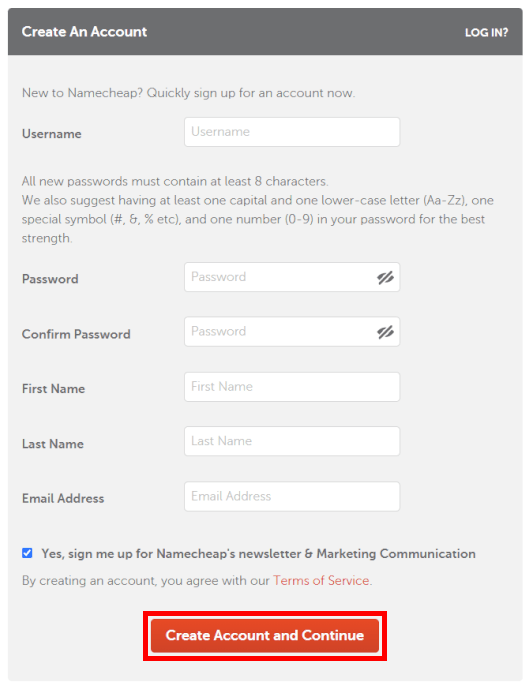
Signing up with Namecheap is child’s play — no tech wizardry required. The account creation process is straightforward, with clear instructions every step of the way. Simply head to the sign-up page, fill out a quick form with your basic details, and you’re good to go.
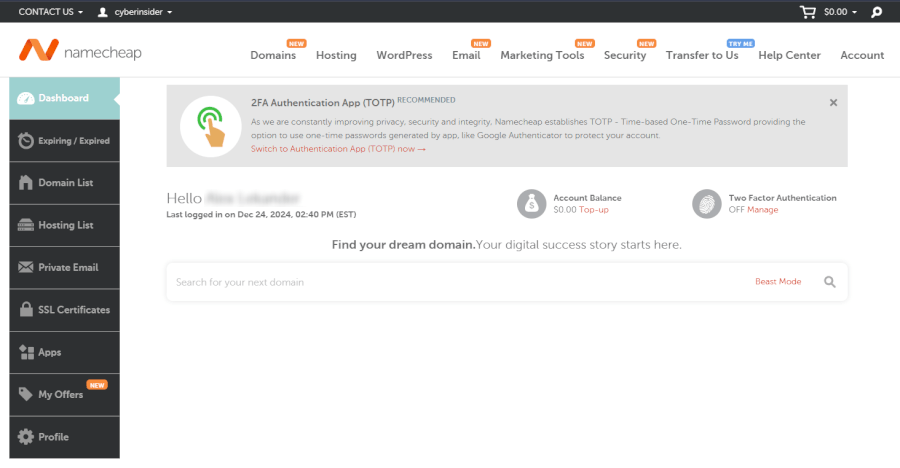
The dashboard you see after logging in is straightforward and easy to use, letting you quickly manage your domains, hosting, and tools.
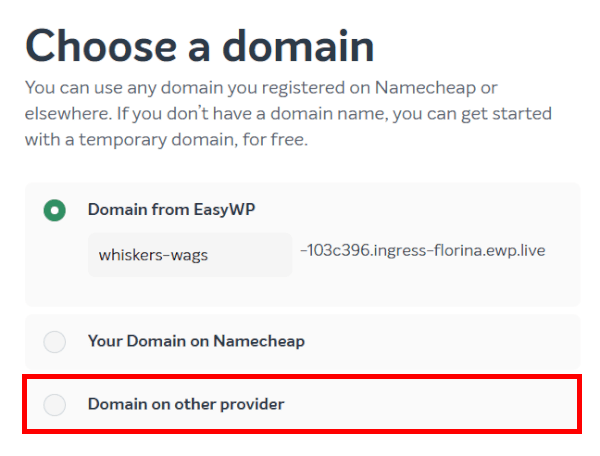
Once your account is good to go, linking your domain to a hosting plan is super simple. If your domain is registered with Namecheap, all it takes is a quick visit to the “Domain List” in your dashboard, selecting your domain, and updating the nameservers to point to Namecheap hosting. It’s a no-fuss process that anyone can handle, even if it’s your first time managing a domain.
For those on advanced hosting plans like reseller, VPS, or dedicated servers, the process involves entering custom nameservers provided in your welcome email. Even if your domain is registered elsewhere, Namecheap has you covered with clear instructions for connecting it to their hosting services.
Namecheap’s thoughtful design and ease of use make what could be a complicated task feel like a breeze, letting you focus on building your website rather than wrestling with the technical details.
Namecheap's cPanel control panel
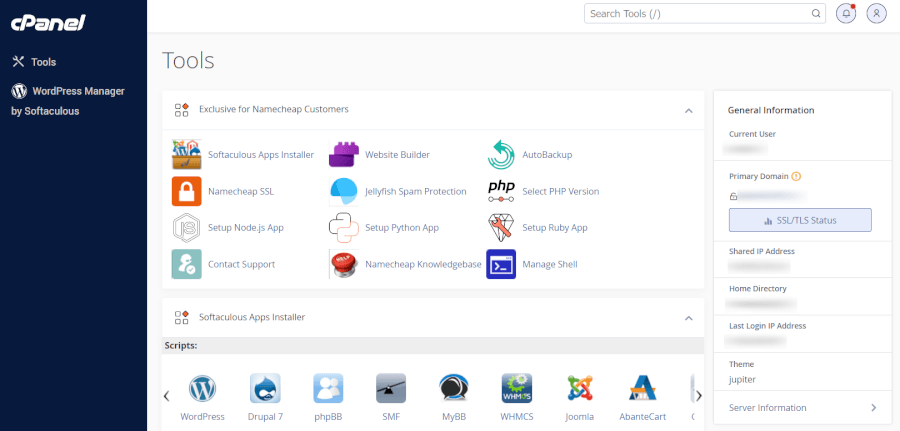
Namecheap's cPanel may not have all the bells and whistles, but its simplicity is definitely a plus. Everything you need is right at your fingertips, organized in a way that makes managing your hosting account straightforward.
With the dashboard, you get a clear snapshot of your hosting and domain management tools. It makes it easy to manage multiple domains, migrate sites, and secure your website, offering a clean, efficient experience with no unnecessary distractions.
One of the main features of cPanel is the Softaculous app installer, making WordPress installation and updates as easy as a few clicks. For those setting up professional email addresses, it’s just a matter of navigating to the “Email” section and using the email accounts tool. While it’s straightforward, it’s worth noting that this service is best for basic email needs, as it shares a reputation across the server. If you're after more advanced email functionality, you might need an upgrade.
While Namecheap’s cPanel is well-organized and functional, if you're after a more beginner-friendly experience, you might find options like Bluehost‘s cPanel to be a bit more intuitive.
Creating your website
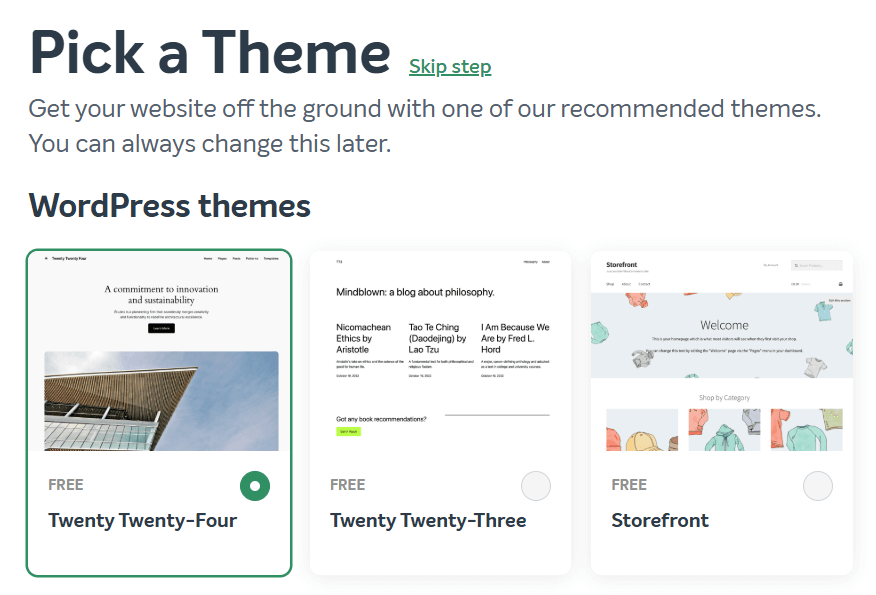
Building a website with Namecheap is refreshingly simple, whether you’re diving into WordPress with EasyWP or experimenting with their drag-and-drop website builder. The tools are designed to make your life easier, whether you're a first-time builder or a seasoned pro.
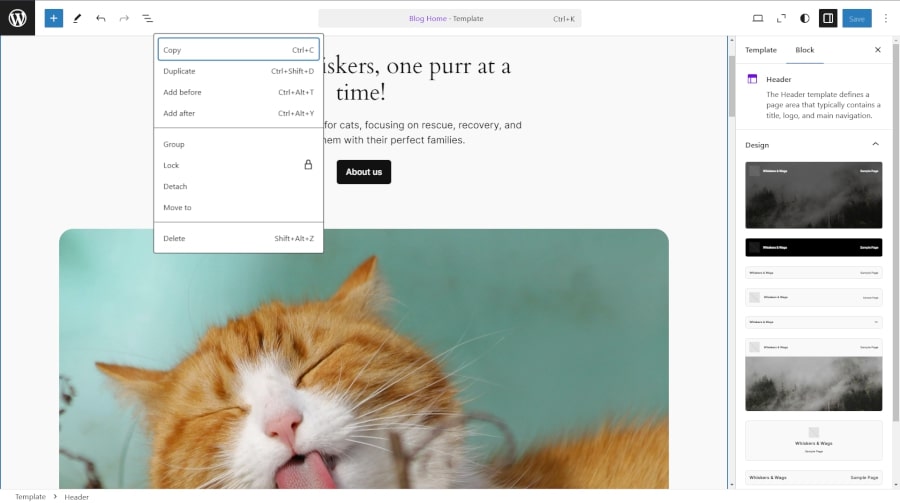
For WordPress fans, EasyWP is a game-changer. It’s managed WordPress hosting that does all the tricky stuff for you. We were up and running in minutes during our tests — no headaches, no tech jargon. From picking a sleek theme to tweaking the design, EasyWP feels intuitive and beginner-friendly.
Namecheap includes a drag-and-drop website builder with all shared hosting plans. It’s as straightforward as picking a template (there are over 200 to choose from) and customizing it to suit your vibe. While the editor is undeniably simple, it does feel a bit old-school compared to some snazzier options like Bluehost’s builder. Still, it’s a solid choice for whipping up a site in no time.
That said, the website builder might feel a bit limiting if you’re after advanced customization or eye-popping visuals.
Performance and uptime: How fast and reliable is Namecheap?
When it comes to keeping your site speedy and reliable, Namecheap does a pretty solid job — especially for the price. With SSD storage powering all hosting plans, your website benefits from faster data retrieval and smoother performance.
However, Namecheap’s data centers are primarily located in the USA and UK, so if your audience is scattered across the globe, adding a CDN (content delivery network) might be a good idea to keep things zippy for everyone.
Here's where Namecheap steps up — they offer a 100% uptime guarantee for their shared and dedicated server hosting plans, while maintaining a 99.9% monthly uptime guarantee for VPS and reseller hosting. These are pretty big promises, and they're not afraid to back them up. If your site experiences unexpected downtime, Namecheap will compensate you, making their guarantees more than just marketing buzzwords.
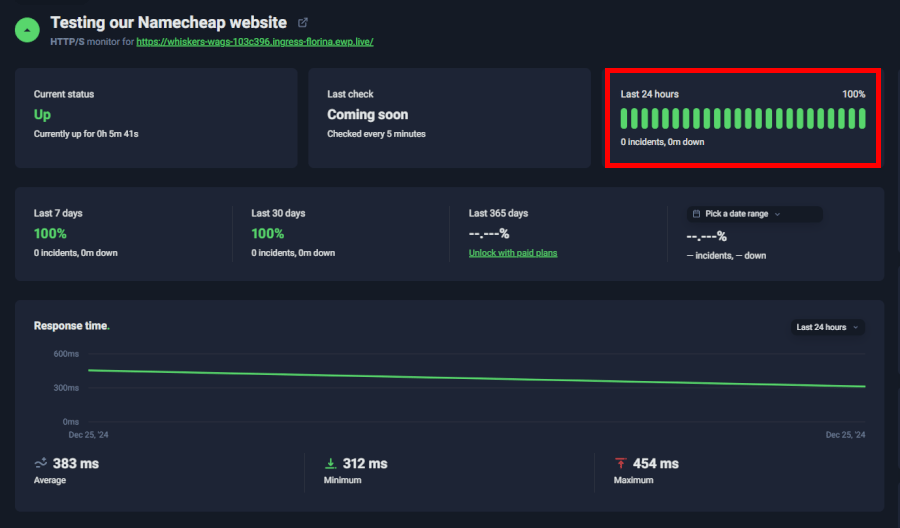
We put Namecheap’s claims to the test with UptimeRobot, and the results were perfect — 100% uptime so far.
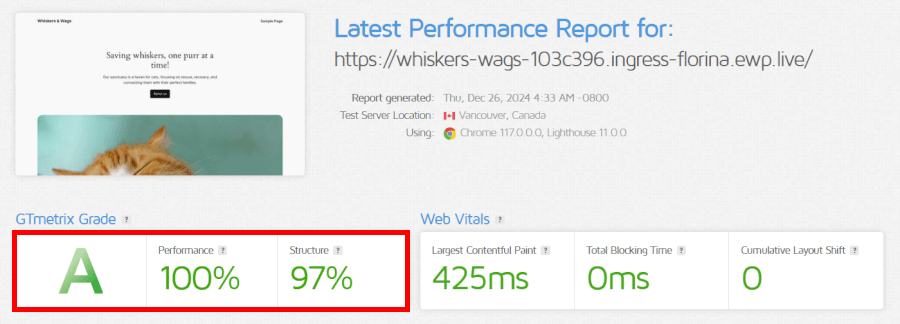
Speed is equally important, and Namecheap doesn’t disappoint. In our GTmetrix tests, the site earned a grade A, with pages loading in just under two seconds. That’s plenty fast for most users. The SSD-powered hosting clearly helps, ensuring your site stays responsive even during busy periods.
Namecheap security: How reliable is your data protection?

When it comes to keeping your website safe, Namecheap goes above and beyond, offering a solid lineup of security features that help protect your site and your peace of mind.
First off, Namecheap includes a free PositiveSSL certificate for your first year, making it easy to secure your website with encrypted communication. This means any data exchanged between your site and visitors, like passwords or payment details, is shielded from prying eyes.
For those looking to ramp up defenses, Namecheap’s PremiumDNS service is a great option. With basic DDoS protection powered by Supersonic CDN, your site stays online even when faced with malicious traffic. It’s an extra layer of protection that ensures your visitors always have access to your site, no matter what.
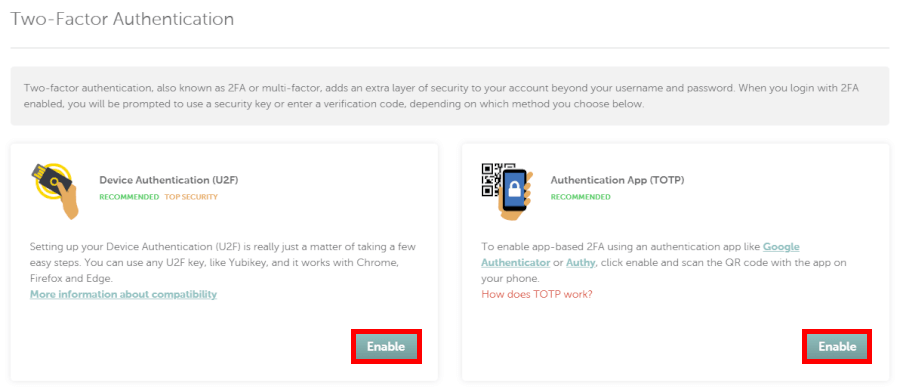
Speaking of protection, enabling two-factor authentication (2FA) is a no-brainer. Namecheap gives you multiple options, from using USB devices to apps like Google Authenticator or Authy. This simple step adds a crucial layer of security to your account and keeps potential threats at bay.

Accidents and mishaps can happen, so backups are a must. Depending on your hosting plan, Namecheap offers backup options ranging from twice a week to daily backups with multiple recovery points.
For domain owners, Namecheap throws in free WHOIS domain privacy. This handy feature keeps your personal information hidden from public databases, reducing the risk of spam, unwanted solicitations, and even identity theft.
If you want to go the extra mile, you can opt for additional security tools like SiteLock, which scans for malware and other vulnerabilities. It’s like having a digital security guard keeping watch over your site.
Namecheap customer support: What level of help awaits?
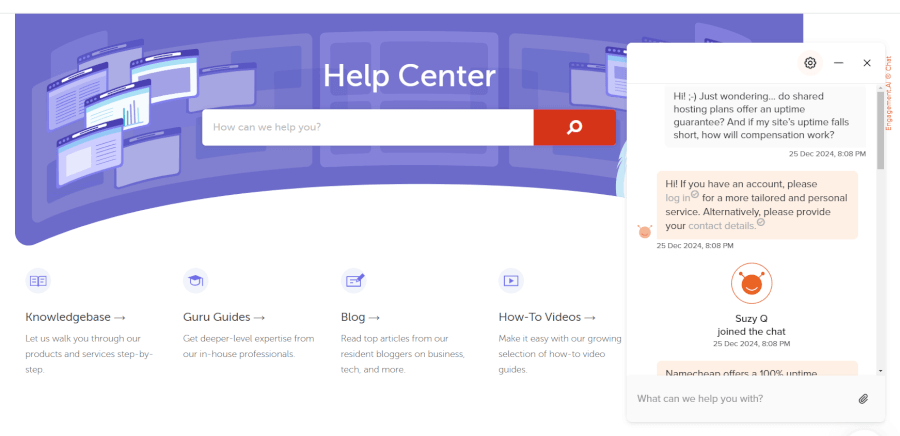
When it comes to customer support, Namecheap does a pretty solid job of keeping its users happy. Sure, there are occasional mentions of delayed responses floating around, but our experience with their live chat support was nothing short of splendid.
The 24/7 live chat option is a lifesaver, especially when you need quick answers. We reached out for help with activating an SSL certificate, and within a minute, a friendly agent jumped into action. Not only did they solve the problem swiftly, but they also kept us in the loop the entire time.
For more intricate issues, there’s a ticketing system, which usually gets back to you within about 90 minutes. While it’s a bit slower than live chat, it’s still reliable. And although you won’t find phone or email support here, the robust knowledge base more than makes up for it. Packed with detailed guides and step-by-step tutorials, it’s perfect for those moments when you’d rather DIY your way out of a problem.
Competition: Namecheap in the ring
Bluehost is great for beginners with its easy WordPress setup and 24/7 phone support. While it offers newer NVMe SSDs for faster speeds, Namecheap stands out for its affordability and value in the long run. If you’re after the latest hardware and top-tier customer support, Bluehost is a solid choice. For budget-conscious users, Namecheap offers comparable performance at a lower cost.
Hostinger shines with faster NVMe SSD storage and more global data centers, providing superior performance, especially for international audiences. While Namecheap offers solid SSD storage, Hostinger’s infrastructure and scalability give it an edge for larger or global sites. If speed and global reach are your top priorities, Hostinger is the better choice, though Namecheap offers great value for money.
DreamHost delivers reliability, speed, and ease of use with its simple dashboard and great uptime. While slightly pricier, it’s a good pick for those who value reliability and security. Namecheap, however, offers strong performance at a more budget-friendly price. If you're willing to spend a bit more for extra features and reliability, DreamHost is a solid competitor.
Final thoughts: Is Namecheap worth it?
After checking out Namecheap‘s offerings, it's clear they have a lot to offer. If you're looking for budget-friendly web hosting, Namecheap is a great choice. They provide competitive pricing and a range of options, from shared hosting to VPS and dedicated servers. Plus, you get a free domain for the first year and free SSL certificates, which is a nice bonus for newcomers.
One of the standout features is Namecheap's user-friendly interface, making it accessible for both beginners and seasoned pros. Their comprehensive security features, including free WHOIS domain privacy and two-factor authentication, ensure your website and data remain safe. However, it's worth noting that the lack of phone support could be a downside for those who prefer direct communication.
Overall, Namecheap is a solid choice for anyone looking for cost-effective hosting services with a decent set of features. It's particularly appealing for small to medium-sized websites and those who prioritize affordability and ease of use.
Namecheap web hosting FAQ
Is Namecheap web hosting worth it?
Yes, Namecheap is a solid choice if you're looking for budget-friendly web hosting with a variety of options, including shared hosting, VPS, and dedicated servers. With competitive pricing, a free domain for the first year, and free SSL certificates, it offers great value, especially for small to medium-sized sites.
Can I host multiple websites under a single hosting plan with Namecheap?
Yes, you can. Namecheap's shared hosting plans, like the “Stellar Plus” and “Stellar Business”, allow you to host multiple websites. This makes it a convenient and cost-effective option for anyone managing more than one site.
Does Namecheap offer a free trial or money-back guarantee for hosting plans?
Namecheap provides a 30-day money-back guarantee on most of their hosting plans. This means you can try their services risk-free and get a refund if you're not completely satisfied within the first month.
How many domains can I host on Namecheap?
The number of domains you can host depends on the hosting plan you choose. For instance, the “Stellar” plan supports up to three domains, while the “Stellar Plus” and “Stellar Business” plans allow for unlimited domains, giving you plenty of flexibility.
Does Namecheap offer automatic backups?
Yes, Namecheap offers automatic backups on some of their hosting plans. While not guaranteed for every plan, options like the “Stellar Plus” come with automated backup features to help safeguard your data.
This Namecheap web hosting review was last updated on January 2, 2025.

Thank you for the great article!
I have one request: you mentioned HackGuardian by EasyWP and linked it to a product not related to Namecheap/EasyWP – https://www.hackerguardian.com/
Would it be possible to replace the link with this one? https://www.namecheap.com/support/knowledgebase/article.aspx/10711/2284/easywp-hackguardian/
Thank you!
Hi Oleh, thanks for the feedback. We have made that change.
Hello Alex,
Thank you very much!